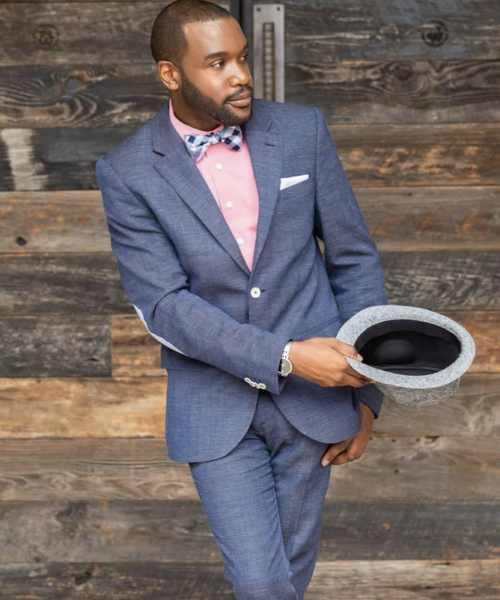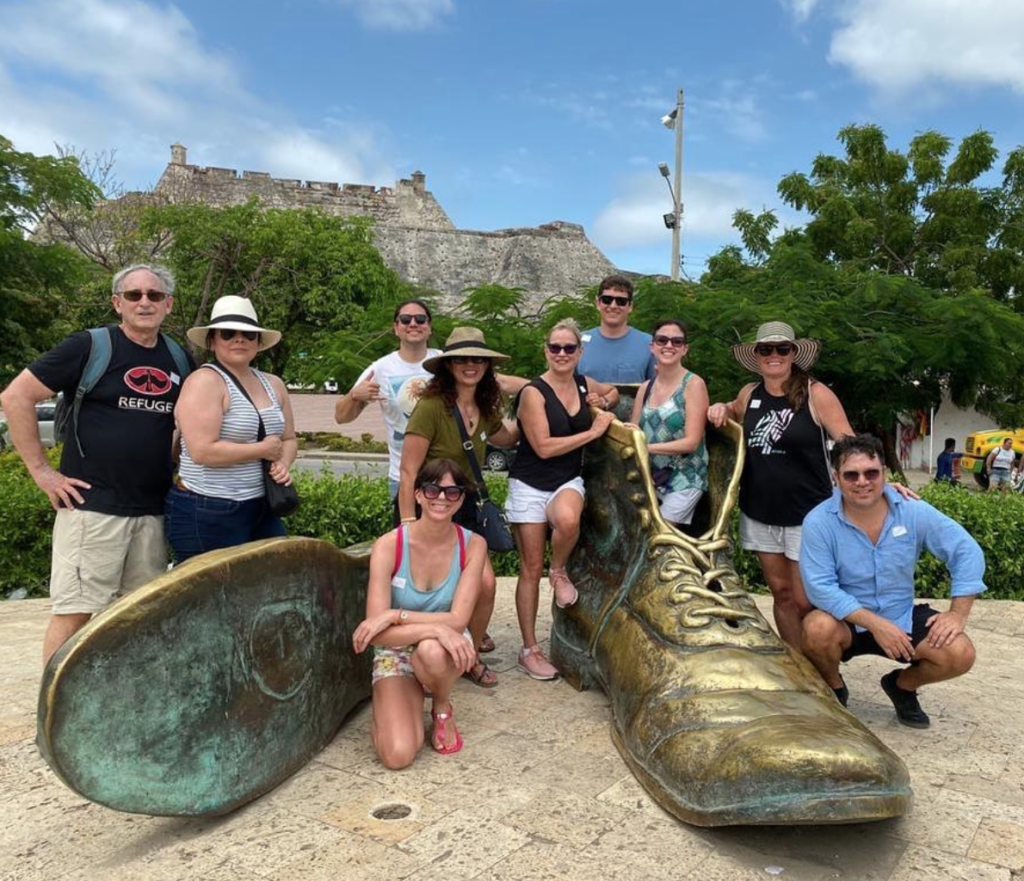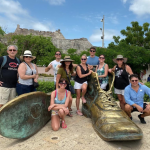
Jay Veal

The idea, as a whole, of having an app where you can schedule, text, charge, communicate, bundle, all the things that you can do at the tips of your fingers, I think it could work all across the board, not only here in the US, but Latin America.

Eduardo Vega
PocketSuite Tutor Pro
Tutor Pro, Eduardo Vega, is a Program Director based between Mexico and California. His multi-lingual experience and diverse cultural background makes him a great asset to our PocketSuite Pro community. Eduardo talks to Managing Editor and CEO, Chinwe Onyeagoro about his love of maps and travel, and what it is like to do business in different countries around the world.
Can you share a little bit about what you do and tell us how you got here?
Long story short, I’m from Colombia. I have lived in the US for 17 years. I recently moved to Tijuana about a year ago. Our school was founded in San Diego about eight years ago and that’s where we used to have all of our operations. San Diego’s right next to Tijuana, so we experienced the best of both worlds with The United States and Tijuana, Mexico. I’m obsessed with maps, culture, and languages. English is my second language. I also had the chance to live in China and I speak Mandarin. I also speak a little bit of French.
As far as what I do in my industry, we teach Spanish as a second language to adults in our school. We started very small, just an ad on Craigslist. We were adding one student at the time. Six months later, we had enough people to support a small office. It was 100 square feet. I was there for three years. After that, we moved to another location where we had three offices. Now there are six of us. We no longer have that office anymore due to COVID and now we’re doing everything online.
Wow, a 100 square feet. Now, six people. That’s huge. And now, virtual. So the world is yours.
Now, virtually, yeah.
You’ve been obsessed with maps, so what’s that story? Did you always pursue a language instructor path or did you have a moment where you decided to get off the track you were on?
I enjoy traveling a lot. So just looking at maps and fantasizing of places that I could explore and travel. It fascinated me. In terms of being on the path of a language instructor, I went to university to study international business at San Diego State. We had to select a foreign language and that’s why I started learning Mandarin. After that, we had to study abroad, that’s why I went to China. I had the opportunity to teach English as a second language to children. I just fell in love with the experience. When I finished my experience in China, I came back to the US, completed my degree. And I no longer pursued foreign trade or import-export. I just decided to put an ad on Craigslist and followed my passion. I worked my way up one student at a time.
What kept you going in those early days where it was just one client and 100 square feet? How did you keep it going? How did you pay the bills? What was the secret there?
There’s no secret. I think it’s just perseverance, keeping a positive attitude. When I started, my girlfriend at the time, who’s now my wife, was paying the bills. One student at a time, I started with one student at $25 an hour. And long story short, I was able to amass ten students in six months. It was a snowball effect. It didn’t pay the bills at the time, but it helped. You have to do it. I don’t have an answer for it. It’s just, you do it, and that’s it.
Many people reference their girlfriend helping, who is often now their wife. How important was that in your process, having that person supporting you and reassuring you?
A 100 percent. I wouldn’t be having this conversation with you guys today if it wasn’t for her. She was not only financial support, but mental support, emotional support. We have now been married for six years. We’ve been together for ten years and we have two children. Not having to worry about that part, emotionally really helps to focus on the other stuff.
What would you say are the best things that have happened to your business in the COVID era?
There are a lot of positive things happening. I mean, there are a lot of bad things, but I’m a person who looks at the glass being half full. We’re blessed. Thank God for the internet. We’re having this conversation. In our business, it was a no-brainer to switch and do things online. We had some students taking classes online, but it was a no brainer. Our community was very supportive. It’s working well and there are many other elements that we hope to bring back at some point. We make many immersion trips, social events, all of that, it’s out of the picture now. We’re just solely a Spanish online school right now.
When I first heard about the immersion trips, my first reaction was, “How do I sign up?” How did that come about? What did it do for your business to offer that?
There’s a common denominator for people, at least in our school, or for anybody who learns a foreign language, they are interested in the culture. They want to visit the place and they’re open-minded. If you see pictures from our trips, you see people from all across the spectrum, baby boomers, African-Americans, you see diversity, see people from Asia, and see people from everywhere. It works. It’s just because the core value of that group or the belief system is they love the culture and they want to travel. There’s a common denominator. There’s no judgment because of your background, or your skin color, or anything. We all share this and we’re all in this together.
I happen to love traveling and we started small with a one day trip south of the border. We’re lucky enough that South of San Diego is Tijuana and we made a one day trip. It worked. Then a couple of months later, I made a three-day trip. Groups are small, ten people max, and it was great. People loved it and they wanted more. We got to the point last year that we made eight trips. We made four one-day trips, two three-day trips, and then one ten-day trip to my home country in Colombia. We visited four different cities. That became a significant differentiator in our school and a big part of what we did.
What are the nuances of doing business in different markets? What has that taught you? Are we more similar or are there some sharp differences in operating in China, Colombia, America, and Mexico?
There are many more similarities between Asia and Latin America because their society is a collectivist society versus the US is more of an individualistic mindset. It’s a lot more competitive. It’s very different in how people operate and interact. In the US, it is more straight to the point. In Asia or Latin America, you first build relationships and then you talk business. That’s very different from my perspective.
As you look up and out at the horizon, what do you see? As you think about your business and where you want it to go and as you think about just the nature of the work that you do, what is your aspiration?
Education-wise, at least in my line of business that is languages or teaching Spanish as a second language, there’s been a shift. Of course, online, it has been a long way coming, but now everything is conducted online. In our school, mainly because of recent events, we had to fast forward some of the projects.
We wanted to start creating a lot more materials, a podcast, a YouTube channel. Now, I’m not using the time to research and put trips together. Now, I’m using that time for a podcast. We started a podcast and we just recently started a YouTube channel. It’s been a very steep learning curve. You have to do it and you have to figure it out as you go. We’re getting better. My wife is the podcast’s co-host and also on the YouTube channel. We’re looking at this new horizon because trips aren’t happening and other things aren’t happening. You have to think on your feet and do it.
We have many solopreneurs who are also working parents, trying to make it all work and fit it in. How did you guys make it all work with the kids?
That was the most challenging part. It was a lot of fun for me and I’m not going to lie. I had a blast, but it was hard because we have a four and a half-year-old and a two and a half-year-old. We’re pretty busy. When my youngest was born, my wife stayed home. She became a stay-at-home mom. That helped with logistics.
This year was going to be even busier than last year, in terms of traveling, but in a way, I am relieved that I’m not doing that. Of course, I miss it, and we had to cancel everything. The opportunity cost has been tremendous, but being home and being with my family has given me a different outlook about how I’d like to conduct my business. How I want to take it forward. Trips are coming back, but probably not as intense as they did before.
There are so many people in the world that speak Spanish. The same is true for English. What’s the motivation to shift and learn another language?
Personal growth, self-development, curiosity about the world, and a window to see a different culture. It’s another door, and it’s another window, it’s curiosity. It just broadens your mind in so many different ways that it gives you perspective. It creates tolerance, it creates compassion, and it makes you a more connected individual. It just makes you a more well-rounded human being in the sense of how you interact, respect, and see the world.
Have you ever thought about instructors in-country, now that you’re online, that would be teaching and training folks here and anywhere as an opportunity?
We just hired our first instructor from Colombia. We have a teacher from Colombia on our team, and she is terrific. She’s incredible and came highly recommended by a student. We were considering bringing more people on board from Spanish speaking countries just because we are not only marketing to the United States. We’re marketing to the world. We want to have diversity also with accents, teachers, and different experiences.
More and more, I hear people talking about Duolingo and Babbel, and all of these self-serve instructional tools and apps. What’s your perspective about the role these apps play in someone’s language acquisition and development?
All those tools that you’re referring to are great. If you want to acquire a foreign language, highly recommend complimenting your class, tutor, conversation, or whatever method you’re doing, you need to complement it with something else. The way I see Duolingo, which I love, Rosetta Stone, I’ve completed two levels, not the biggest fan, but I’ve done it. Babbel is great. Hello Panda, I mean, you name them, there’s a plethora of paid and free resources, podcasts, YouTube videos, websites that are complements to one’s language learning journey.
I tell my students, you need to combine three or four of these resources into a well-balanced routine. I use the analogy of preparing for a marathon, that doesn’t happen overnight. You need to eat well and you need to cut down on alcohol. You need to sleep for eight hours. You need to drink water, and you need to put in your runs, a short run, a long run, sprints, stretch, etc. It’s the same thing for language learning. One needs the other. And the one you choose is not that one is better than the other; it’s the one that is working well for you at this particular moment. In three months, it may not be the same resource. Still, the fundamental, or the number one thing that would get people conversational in the language is human interaction, conversation, making those mistakes, and not being afraid of making those mistakes. And that one can only get with another person.
Everybody says, “Well, you want to learn French, maybe you should find a French girlfriend.” How realistic is it to pick up a language without full immersion into a culture?
There are two parts to that question, and the short answer is no, you can create your immersion environment without leaving your home. I mean, we just talked about it, there are a plethora of resources. You could have your class online. You could meet someone locally who speaks the language. You can do your Duolingo, do the Babbel, find a Mexican restaurant or a French restaurant, and odds are someone who works there, speaks the language. You have to look for opportunities and seize the moment. You have to take accountability for your learning, and you have to be active and proactive.
As parents, do you want to introduce languages to your children as early as possible?
Yes. We speak three languages at home. They pick it up quickly.
Can you share a little bit about your experience with PocketSuite, for people who are just starting and thinking about how they might benefit from using it?
I got started with PocketSuite in 2016, it’s been four years. I love the app. It has improved by leaps and bounds since the very beginning. I liked the portability, the ease of use, the customer service is excellent. I feel that I’ve contributed to some of the improvements. At the early stages, I was very active, just asking for things, or suggesting things, and then I would get a reply, “Yeah, we’ll put that on the ticket.” Or, “Good idea.” I feel like I am a part of what the app is today, or what you have built, which is excellent. I really like the community that you are trying to build. I think it’s a valuable tool to connect all the pros and share all these stories.
Any advice for people who are just getting started? If they love language, they love to travel like you, and they’re looking to create something similar?
Just do it. Don’t think about it. I love Nike not just because of their amazing sports clothing and cool logo, but it’s the slogan, their motto. When you overthink, you don’t do things. You just have to go for it. It doesn’t have to be perfect to get started.
Where can people find you and learn more? Where do they find the podcast?
For the podcast, it’s Platicando. It’s on YouTube, the channel, or we have an Instagram account for our school, cultural language center, our website culturallanguagecenter.com, podcasts, Instagram, Platicando media. Those are some places that people can find us online and try to learn some Spanish with us.
How successful do you think PocketSuite would be in the Spanish speaking world, and in some of the countries you’ve mentioned? Do you think the platform would work in Mexico and Colombia?
The way I see PocketSuite is like a jam-packed mini CRM that will come in very handy. I think it could do very well. It’s just a matter of how it gets positioned and there needs to be some cultural tweaks.
The idea, as a whole, of having an app where you can schedule, text, charge, communicate, bundle, all the things that you can do at the tips of your fingers, I think it could work all across the board, not only here in the US, but Latin America. There is a huge market, 20 countries that speak Spanish as a first language. Even in Asia, I won’t be surprised if there isn’t anything like PocketSuite on the other side of the world, but not as good as yours, of course.
Thank you Eduardo.

